QNAP today launched its TVS-hx74 series. This new series has relatively new CPUs with Intel Alder Lake generation parts. This is part of QNAP’s line focused mostly on QuTS Hero, the company’s ZFS-based OS but it can run standard QTS as well. When we dug into the specs of these, we found a few interesting features.
QNAP TVS-hx74 Series Launched
There are three main models in this series, the QNAP TVS-h474, TVS-h674, and the TVS-h874. The hx74 is the line while the 4, 6, or 8 digit is the number of 3.5″ bays. As one would expect, the compute scales with the number of bays. The TVS-h674 and TVS-h874 support the top-end Intel Core i5-12400 processor with 32GB of memory. There is another Core i3-12100 and 16GB configuration for the TVS-h674 and then a lower-end Pentium Gold G7400 CPU in the 4-bay model.
| TVS-h474 | TVS-h674 | TVS-h874 | |
| Models | TVS-h474-PT-8G: Intel Pentium Gold G7400 dual-core/4-thread processor (burst up to 3.7 GHz), 8 GB DDR4 (1 x 8 GB) memory |
TVS-h674-i5-32G: Intel Core i5-12400 six-core/12-thread processor (burst up to 4.4 GHz), 32 GB DDR4 (2 x 16 GB) memory TVS-h674-i3-16G: Intel Core i3-12100 quad-core/8-thread processor (burst up to 4.3 GHz), 16 GB DDR4 (1 x 16 GB) memory |
TVS-h874-i5-32G: Intel Core i5-12400 six-core/12-thread processor (burst up to 4.4 GHz), 32 GB DDR4 (2 x 16 GB) memory |
| 3.5″ Bays | 4 | 6 | 8 |
| Maximum memory | 128 GB (2 x 64 GB) | 128 GB (2 x 64 GB) | 128 GB (2 x 64 GB) |
| High-speed network ports | 2 x 2.5GbE RJ45 | 2 x 2.5GbE RJ45 | 2 x 2.5GbE RJ45 |
| PCIe Gen 4 slots | 2 | 2 | 2 |
| M.2 PCIe slots | 2 | 2 | 2 |
| USB 3.2 Gen 2 (10Gbps) ports | 3 | 3 | 3 |
| Warranty | 3-year standard warranty (Extendable up to 5 years) | 3-year standard warranty (Extendable up to 5 years) | 3-year standard warranty (Extendable up to 5 years) |
The above chart is based off of one from QNAP, but the company did not mention the number of bays in its spec table so we augmented that.
As we dug into the specs, the memory was very interesting indeed. Alder Lake supports DDR4 or DDR5, but these NAS units support DDR4 SODIMMs. It also seems like QNAP is using non-ECC memory by default, but enables ECC on this platform. Here is the slide we found on that:
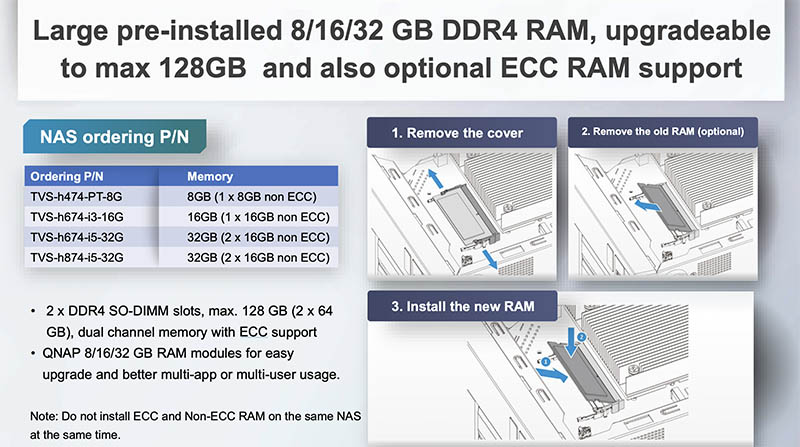
DDR4 usage makes sense, as this is a NAS. On the other hand, we wish, especially given the similar cost, that QNAP used ECC memory on these units. It almost feels strange that they support ECC, but QNAP is not utilizing it while showing a ZFS NAS.
We also found a view of inside the system. Here we can see the dual M.2 slots:
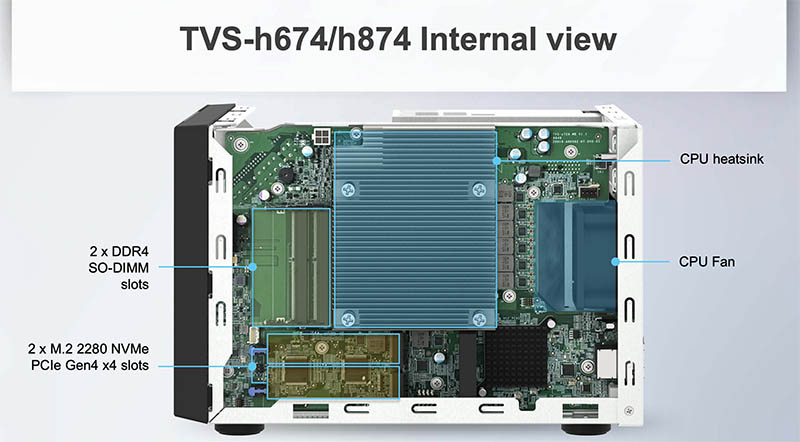
The PCIe expansion slots are on the other side of the motherboard. Here is the rear view annotated with features:
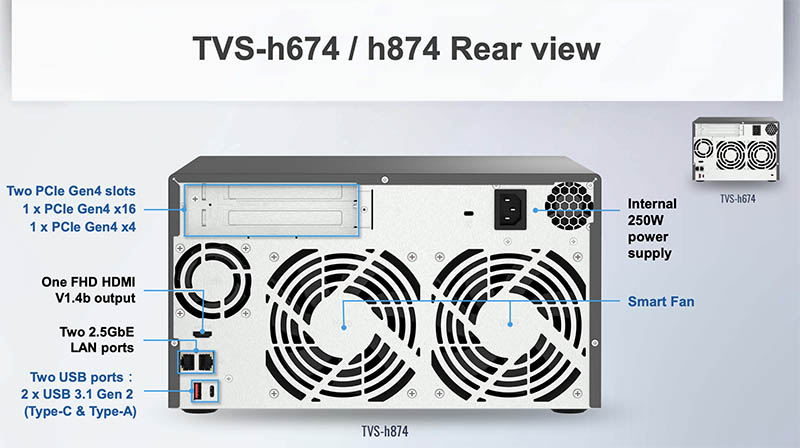
Again we see QNAP using 2.5GbE here. We cannot help but wonder if part of QNAP’s strategy is to have customers use PCIe to customize for higher-level features. For example, servers often have 1GbE onboard, and leave higher speed networking to PCIe cards or OCP NIC 3.0 modules. If you want a 10GbE or 25GbE NIC, more NICs, WiFi, or more M.2 slots, QNAP says to add PCIe cards.
Final Words
We generally like the fact that QNAP is much more aggressive than its competitors like Synology on introducing new hardware generations. Intel Alder Lake is still the current generation and all of these NAS units use 2.5GbE. At the same time, not including ECC memory with the unit, but supporting ECC seems like a strange cost savings strategy since the price difference for low capacity 4-16GB modules is very small these days, especially as the industry transitions to DDR5.
We do like that QNAP is pushing QuTS hero heavily with this unit as the ZFS-based solution is one of QNAP’s best features. Hopefully, we will get the opportunity to try one of these out one day.

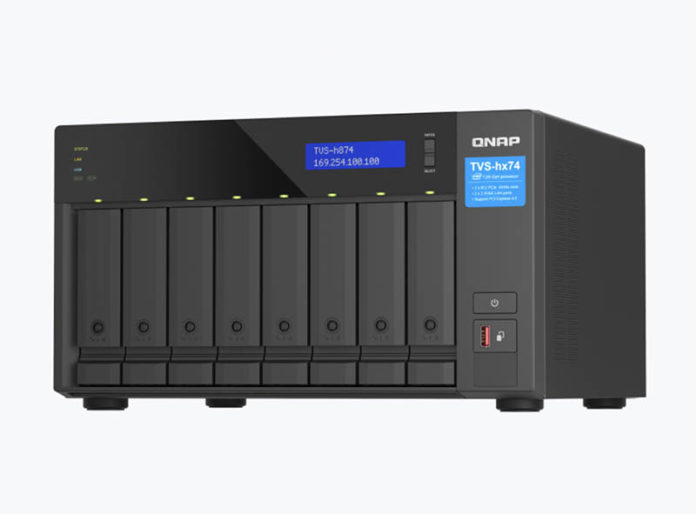

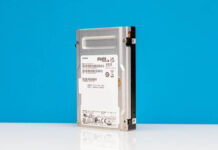
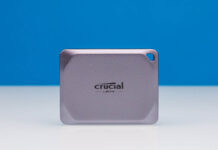
Does the HDMI port and x86 CPU mean a full OS could be installed on this?
I’d much rather have FreeBSD or CentOS on this then QNAP’s OS.
I have an x86 QNAP device currently running Windows Server 2022, and have booted Linux for testing, you can do whatever you want with it it’s basically a full PC.
The article states “It almost feels strange that they support ECC, but QNAP is not utilizing it while showing a ZFS NAS.” In my opinion no ECC in the default configuration is a big deal. The customers who purchase such devices just want something that works without having to be experts.
I don’t know any source that recommends ZFS without ECC RAM. Shipping such units would seem to go against best engineering practices and has the potential to damage the reputation of ZFS. It could also cause customers to lose data when they shouldn’t.
I don’t think ECC functionality really works on these x74 models unless there one using embedded Xeon; Intel had pulled out ECC from their lower-level desktop CPU a few generations ago.
The “with ECC support” wording in the figure might just mean it’s bootable with ECC memory modules.
@RQ Centos is dead I think. OEL would be my choice.
I’ve been reading about these units for a few weeks now, and have yet to see any info on pricing. My synology 1512+ is getting a little short on storage, and the modern consumer Synology units are still stuck on 1Gb ethernet, so one of these seems the natural upgrade choice (though that said, I imagine my Synology surveillance station licenses won’t transfer. Yuck).
Anyway, I’m hoping this is price as a viable alternative to the Synology 1522/1621 series.
qnap good hardware poor SO, synology poor hardware good SO
I do not understand how can these NAS units support ECC technology. As I know to get it work, the CPU, mobo and RAM have to support ECC. Non of these CPU’s support ECC memory.
I just got a quote on one of these from a qnap reseller – and they are saying they do not support ECC.
Check out the now official product page :
https://www.qnap.com/en/product/tvs-h874
While its not ideal, at least it makes sense given the processor platform.
Everything else about this system is extremely good (i even understand leaving 10 or 25Gbps networking to expansion cards)
The CPU will allow a tonne of uses that other similar systems would struggle with.
However, the lack of ECC will scare away most I’d imagine.
Alder Lake CPU do support ECC, but only when paired with W680 chipset. I wonder if QNAP is using this chipset in this NAS.
There are 2 memory slots. The largest DDR4 SODIMM is 32Gb. How do you get 128Gb of RAM in one?